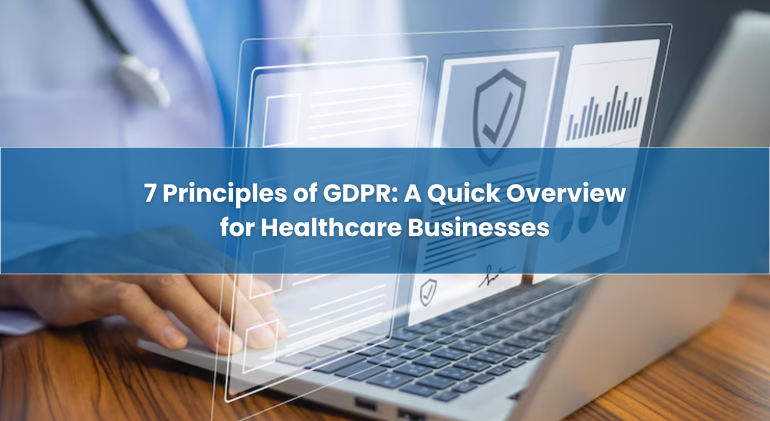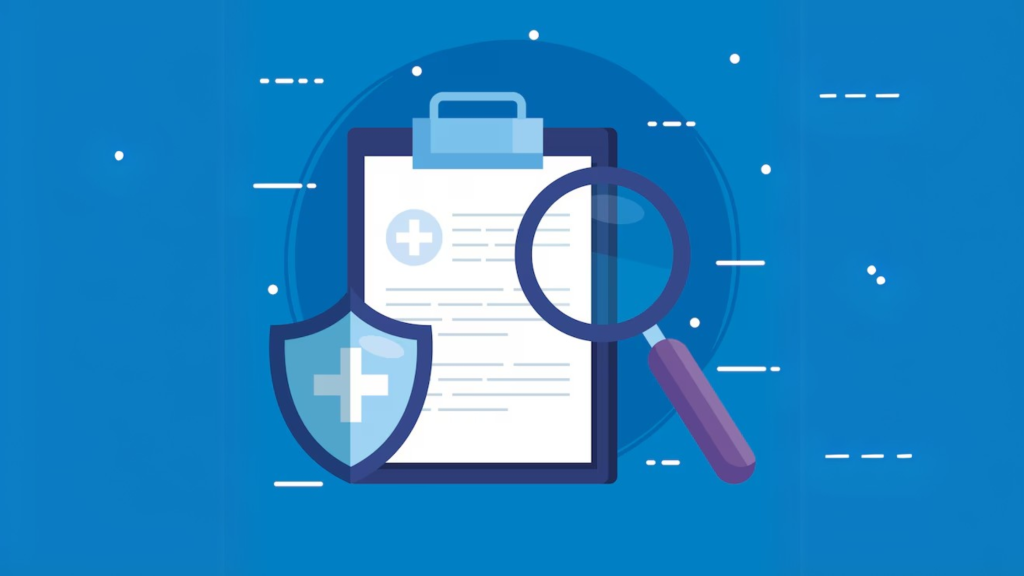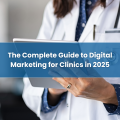
7 Principles of GDPR: A Quick Overview for Healthcare Businesses
In the healthcare sector, patient data safety is not just a regulatory requirement but morally imperative. Under the General Data Protection Regulation (GDPR), organizations receive a framework that determines appropriate personal data handling procedures.
Healthcare regulations and ethical principles stipulate that patient data protection is both a legal requirement and a professional responsibility.
The GDPR states that personal data must be handled with maximum care through prescribed procedures. Hence, the seven principles of GDPR must be understood and implemented by organizations that intend to have GDPR compliance in the healthcare sector.
Why Understanding the 7 Principles of GDPR Is Crucial for Healthcare?

Organizations within the healthcare sector manage numerous sensitive patient data records, which expose them to possible data breaches. The GDPR requires healthcare organizations to notify the authorities within 72 hours regarding data breaches, while disclosing affected patient data.
The non-compliance with GDPR rules leads to substantial penalties while simultaneously destroying patient trust in healthcare services.
Here’s an example – OLVG (Onze Lieve Vrouwe Gasthuis) Hospital in Amsterdam was fined €440,000 by the Dutch Data Protection Authority (DPA) in February 2021 for inadequate protection of patient medical records, violating Article 32(1) of GDPR.
Through the principles of GDPR, healthcare providers achieve the ability to handle complex patient data protection frameworks successfully. The complete understanding of GDPR regulations enables organizations to maintain GDPR compliance and protect sensitive patient data, thus avoiding potential heavy penalties.
The 7 Principles of GDPR: A Healthcare Perspective
1.Lawfulness, Fairness, and Transparency
Healthcare organizations need to handle patient information with lawful procedures, complete transparency, and fair data processing practices. Organizations must tell patients about data utilization before starting data handling, while keeping their operations on authentic, valid legal bases.
Example: A hospital updates its privacy policy to inform patients about how their data will be used, ensuring compliance with GDPR’s transparency requirements.
2.Purpose Limitation
Organizations must obtain data only for particular reasons stated explicitly, along with valid legal bases. When doctors collect patients’ medical records for treatment, they should not redirect this information to unrelated research activities unless patients give new consent.
Example: A clinic collects patient data for treatment purposes and later seeks explicit consent before using the data for a research study, adhering to GDPR’s purpose limitation principle.
3.Data Minimization
The collection process must limit itself to data points for declared usage. Healthcare service providers who follow GDPR should avoid obtaining unnecessary patient details that do not support diagnosis or treatment activities.
Example: A healthcare provider designs intake forms to collect only essential information needed for patient care, avoiding unnecessary data collection.
4.Accuracy
A healthcare provider must keep patient information accurate and current at all times. The use of incorrect medical data causes medical professionals to make wrong diagnosis, giving improper treatments to patients and leading to medical treatment issues and GDPR noncompliance in healthcare organizations.
Example: Patient personal information accuracy becomes achievable through the hospital’s implementation of a regular self-update system for patient-record maintenance.

5.Storage Limitation
The storage period of patient information must match its necessary lifespan. The secure destruction of personal medical and legal requirements period data demands that healthcare providers develop specific guidelines for secure data storage.
Example: A medical professional uses GDPR-compliant guidelines for keeping patient records within specific timeframes, before performing secure deletion operations.
6.Integrity and Confidentiality
Data protection for patients demands both the prevention of illegal data access and the safety of data from harm or loss.
Example: A healthcare facility implements encryption technologies and access control systems to safeguard electronic health records, thereby protecting their integrity through secure confidentiality.
7.Accountability
Healthcare organizations fulfill GDPR requirements and must prove their adherence to the principles. Healthcare organizations need to build records for all data processing operations while developing readiness for audits conducted by regulatory authorities.
Healthcare organizations meet GDPR requirements by implementing these principles and need to establish evidence of their adherence. To maintain accountability, readiness, and compliance with audits, healthcare organizations must prepare documentation for every data processing operation during creation and development
Example: A hospital appoints a Data Protection Officer (DPO) to oversee GDPR compliance and conducts regular audits to demonstrate accountability.
The Role of GDPR Service Providers in the UK
The implementation of GDPR represents a challenging task for medical organizations that operate in the healthcare sector.
A GDPR service provider in the UK offers customized solutions that help organizations follow the necessary compliance rules. GDPR service providers help organizations execute patient data protection audits, implement consent mechanisms, and train staff on data protection practices.
Real-World Implications of GDPR in Healthcare
GDPR has substantial effects on healthcare organizations.
According to a report by CMS Law, healthcare organizations such as hospitals and pharmacies, alongside doctors and medicine suppliers from 26 different countries, have imposed 202 fines for data protection violations! The 202 financial penalties for data breaches totalled at €16.5 million during GDPR enforcement, said the CMS Law data.
The number of cases shows how essential it is for healthcare organizations to follow GDPR principles to prevent major financial penalties and safeguard patient information.
Navigating GDPR Compliance in Healthcare
Achieving GDPR compliance in the healthcare sector involves more than understanding the principles; it requires actionable steps:
- Conduct Data Audits: Regularly review data processing activities to identify and mitigate risks.
- Appoint a Data Protection Officer (DPO): Especially critical for organizations handling large volumes of sensitive data.
- Implement Consent Mechanisms: Ensure that patient consent is informed, specific, and revocable.
- Engage a GDPR Service Provider in the UK: Partnering with experts can streamline compliance efforts and provide tailored solutions.
How Can Snap Digital Solutions Help?
Snap Digital Solutions provides healthcare organizations with specialized UK-based services for achieving GDPR compliance, which particularly focus on patient data protection. Here’s how we align with the 7 Principles of GDPR:
- Our company delivers legal and transparent data processing. We operate as a GDPR-aligned data center that implements legal procedures for all data processing activities. Our representatives run the data protection frameworks while ensuring ethical processing standards.

- Our medical transcription services are tailored for private consultants, clinics, and hospitals, ensuring that all medical documents are utilized solely for documented healthcare needs.
- Snap Digital Solutions collects only essential data for their operations. Their solutions are designed to work with the required patient information for specific services, preventing the collection of unnecessary data.
- To maintain data accuracy, the company produces precise medical letters and detailed medico-legal reports, ensuring accurate patient information
- Data at our ISO 27001:2013 compliant production and operations center adheres to strict data retention standards, preventing unnecessary data storage periods
- We implement a DPO position and international standards compliance to perform ongoing data processing activity monitoring as well as documentation procedures.
Healthcare organizations seeking GDPR compliance solutions can rely on Snap Digital Solutions for secure data processing, accurate results, and appropriate data usage. Get in touch with us for dependable GDPR support in the British market, enhancing methods of safeguarding patient information.






